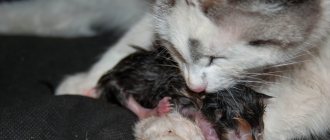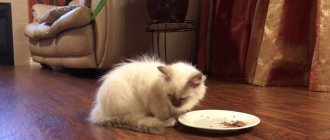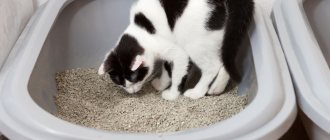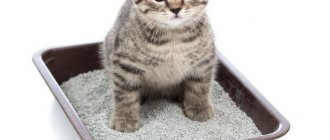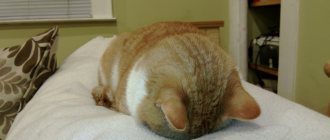If a one-month-old kitten does not poop for several days, the owner should be concerned about the baby’s condition, because long periods between bowel movements negatively affect the pet’s health and cause constipation. Therefore, if an animal is unable to go to the toilet for a long time, and is bothered by accompanying pathological symptoms, it is better not to delay a visit to the veterinarian.
Kitten and toilet - frequency, features, nuances
In the early stages of life, the formation and development of the digestive system occurs in small kittens.
Normally, your pet should poop in the litter box every day. The development of independent bowel movements and intestinal health are positively influenced by the milk that the cat feeds the kitten. If the kitten is weaned, then it should be given milk from a bottle with a nipple, gradually accustoming it to thicker and more structured food. How does a one month old kitten poop:
- He should poop on his own 3 to 6 times a day.
- The stool should have a pasty, yellow or brown consistency.
- Feces should not contain any additional impurities - mucus, food debris, hair, blood, water, and so on.
- The stool should not be liquid or foamy.
- The abdomen is soft and painless.
shutterstock
In two to three months, the cub completely switches to a nutritious diet and poops regularly. Over time, the chair becomes decorated. A one-month-old kitten may not poop due to changes in living conditions, severe stress, insufficient fluids and poor nutrition.
Defecation of newborn kittens
A natural mechanism when a cat helps a newborn kitten go to the toilet. The animal licks the baby, during which the abdomen is massaged, the urinary canal and anus are irritated. These movements help him pee and poop in the first days of life. If for some reason the mother cat is not nearby, then the owner should irritate the groin area themselves using a cotton pad or swab.
© shutterstock
Care and assistance of the cat in the kitten's toilet lasts for a month, after which it is necessary to accustom the pet to the litter box.
Kittens begin to poop on their own at one month of age. If the kitten does not poop, it will experience discomfort - gas, constipation, and a tight belly.
Causes of constipation
What causes constipation in a cat? And why can't your little kitten go to the toilet? He is only 1 month old! There are many such reasons known. Let's list the most common ones.
In kittens
Nature has wisely provided measures to protect cat babies from constipation: a mother cat feeds them milk for up to 1 or even 3 months - ideal food for babies. And in order to rid them of feces, urine and gases, he licks them several times a day, while simultaneously massaging the tummy. This is ideal.
Unfortunately, constipation in kittens sometimes happens. There may be several reasons for this problem:
stress - due to moving to new owners, aggressive games with children, frightening sounds, etc. Try to protect the kitten from unnecessary attention, give it the opportunity to get used to its new home. If he is 1 month old, be prepared for the fact that he may sit in a secluded corner for the first day, and later begin to explore all the nooks and crannies of the apartment. Be patient with him so that you don’t wonder later “why doesn’t the kitten poop?”;
- change in the new feed house. Ask the cat's owners what they gave their kittens to eat, and do not change your pet's menu for several days. It should be gradually transferred to a new food;
- insufficient care of the mother - already 1 month after birth she may stop licking the babies or even refuse to feed them. In this case, you need to give them a light tummy massage several times a day - from head to tail. If it doesn’t help, try irritating the anus area with a soft brush or moistened cotton swab;
- unsatisfactory nutrition. When you bring home a tailed cub who is only 1 month old, prepare him only creamy food, remembering to constantly pour fresh water. What should I give him at one and a half months? Boiled minced meat, adding vegetables to it;
- fear – try to toilet train your cat baby without resorting to punishment. Otherwise, he may become constipated from fright. Don't forget that cats are the smartest creatures on earth with a good memory;
- and, of course, worms. You know how to help in this case - with antihistamines.
In adult pets
In adult pets, the list of causes of constipation is even longer:
- diet violation. Curious by nature, cats often swallow objects that complicate the formation of feces of normal consistency: sand, bones, scraps of sausage casings. In addition - for fluffy breeds - a tendency to become absorbed when licking their own fur;
- physical inactivity is a sedentary lifestyle. If your cat doesn't move, don't be surprised by constipation! Therefore, play with your cat, even if he is already a grandfather by a cat’s standards!
- overly caring owners can stuff their purrs with a large number of all kinds of medications, vitamin preparations, supplements including iron, diuretics... All of them can also cause stool disorders;
- no cat is immune from injuries that can lead to pain during bowel movements or constipation;
- purrs also suffer from tumors of the rectum or prostate (cats), enlarged lymph nodes, polyps - hence intestinal obstruction;
- endocrine (hypoglycemia) and neurological (for example, paralysis) diseases;
- old age - grandfather and grandmother cats, like people, lose the elasticity of the muscles responsible for emptying;
- infection with intestinal parasites.
Regardless of the cause of constipation in cats, it is necessary to treat it: with prolonged stool disorder, dehydration and intoxication of the body begins. They, in turn, disrupt the functioning of the heart, kidneys, and liver, and hair begins to fall out. If the animal is not treated, it may die. Find out what cat owners should know about such a delicate problem in the video from the words of the veterinarian himself (Modern Veterinary Medicine).
Preventing constipation
If your pet does not go to the toilet regularly for more than 5 days, and this happens repeatedly, we are talking about chronic constipation. Massage and enemas cannot correct this situation. First of all, review your little pet's diet. What does he eat? Does he eat specialized food designed for his age, or is he content with kibble from your table? Kittens fed high quality food (holistic or super-premium) never suffer from constipation.
If you prefer to feed your pet natural products, make sure that its diet consists not only of meat, but also of cereals and vegetables. They have a positive effect on intestinal motility. Older kittens need to add a little steamed bran to the minced meat. They help normalize the functioning of the digestive system.
Be sure to include in your pet’s daily menu:
- cereal dishes - boiled porridge made from buckwheat and rice cereals mixed with minced chicken;
- vegetable stew - boiled or stewed in a small amount of water or weak meat broth, diced zucchini, pumpkin, beets, carrots.
If your pet pulls its muzzle towards the skin of a fresh cucumber or cabbage, or happily eats green peas or slices of melon, you should under no circumstances prevent it from doing so! Fresh vegetables and melons help improve intestinal function, cope with chronic constipation, and make the animal feel great.
Our pets are incredibly clean! And they are ready to preen themselves, licking their fluffy fur, all day long, and, I must admit, they look great. But, unfortunately, during the licking process, a lot of hair gets into the stomach, where it forms lumps that interfere with the normal functioning of the gastrointestinal tract. It is enough to get rid of them and constipation will disappear. To remove hairballs, there are special foods that significantly alleviate the animal’s condition. And in order to ensure that as little hair as possible gets into the stomach, the cat must be combed. For short-haired breeds, a special mitten is sufficient. The coat of a long-haired cat is combed with special combs, slickers and furminators.
The most important way to prevent constipation for kittens (and their owners) is movement. The more the animal moves, the better the situation with intestinal motility. Buy a play set for your little pet, several toys and rattle balls. You will see that soon the functioning of his intestines will completely improve.
Veterinarian advice
If the situation is not yet dangerous, veterinarians advise supplementing treatment at home with petroleum jelly. It is poured from the side into the cat's mouth using a disposable syringe without a needle. Individual dosage – from 5 to 50 milliliters per day.
Vetpharmacies also have special preparations in their arsenal: “Lactusan”, “Duphalac”, “Sodium picosulfate”, thanks to which he can poop. Plus the well-known “Festal” and “Espumizan”. But Magnesia (magnesium sulfate) is contraindicated for cats as a laxative! We hope our tips will be useful to you and your pets. Take care of them, and they will return you a hundredfold!
What to do if the kitten does not go to the toilet in a big way?
Are you unable to take your pet to the doctor? No problem. An enema with lukewarm water and a small amount of Vaseline oil will help him recover successfully. Depending on how many days or weeks your mustachioed patient is, its volume can reach 1-5 milliliters.
As a syringe, you can use a five-cc syringe without a needle. Fill it with the required amount of liquid, lubricate the cone with Vaseline and gently but firmly, with some pressure, insert it into the kitten’s anus. After some time, your patient will poop easily and painlessly.
Interesting video: A veterinarian gives an enema to a one-month-old kitten
What's normal and what's not?
If you have never had a cat in your apartment before, you need to know why kittens vocalize most often:
weaned from their mother, they experience stress; animals want to eat, but don’t know where the food is; ready to play, so they do their best to attract attention.
Knowing about these cat habits, it is easy to project them onto the toilet situation. In the new walls, without a mother who took care of everything, including the hygiene of her baby, the kitten is lost. Even if he was already litter box trained, everything was different in the old house! Well, how can you not start meowing all over the apartment!
The owner is faced with a rather tricky task - to help the pet “remember everything” and convince him that the new tray is no worse than the old one. The situation is more difficult when the kitten has not yet acquired the necessary skills.
Its owner has to start training from scratch: watch with sympathy as the baby walks around the rooms and cries, clearly worried about where to relieve himself, and in the toilet, where he is dragged, cannot figure out that it is the tray that will give the long-awaited relief, and squeaks even more pitifully. However, no matter how difficult the lessons turn out to be, this is a normal process and there is no reason to worry.
Another fairly typical cause of concern may be the desire of the mustachioed-striped one to certainly attract the attention of his owners: he wants someone reliable to be nearby, if necessary, to help, to protect him from “external enemies” who strive to “offend the weak” in situations when he is particularly defenseless and not ready to escape. However, this is a purely individual question.
Some kittens will prefer an intimate setting for toileting, while others will want to remain the center of attention. There are many cases when respectable cats, accustomed to independence from youth, having matured, begin to attract the attention of people in precisely this way (in the absence of any physiological problems).
However, this is a purely individual question. Some kittens will prefer an intimate environment for toileting, others will want to remain the center of attention.
There are many cases when respectable cats, accustomed to independence from youth, having matured, begin to attract the attention of people in precisely this way (in the absence of any physiological problems).
However, in order to be sure that your pet’s health is all right, you need to know some of the characteristics of the cat’s body and notice any deviation from the norm. Here are a couple of important points:
- if plant foods occupy a significant place in the diet, then the kitten often does “big things” than if it was fed mainly protein foods;
- Kittens walk “small” more often than older animals, since their bladder is very small.
The point, of course, is not to record on paper every visit of your pet to the toilet, but if you realize that he hasn’t been there for a long time, perhaps you will prevent the development of any gastrointestinal diseases in your baby and find a way to help to him.
What to do for prevention?
If the baby has not yet gotten used to the new owners, then their task is to accustom him to the new toilet.
As soon as the kitten appears in the house, you must immediately introduce him to his personal toilet and show him where the litter box is located. Sometimes in a new place an animal does not know where to relieve itself, and its upbringing does not allow it to go anywhere. In this case, the baby suffers, which is why constipation appears. Another important point is the selection of proper, balanced nutrition. It is better to create a diet or select a suitable brand of ready-made food together with a veterinarian.
It is forbidden to suddenly switch to a new type of food, and if the cat eats natural food, it is important to ensure that prohibited foods do not fall into his bowl - fried, spicy, salty, fatty, sweets. In addition, you should periodically give your pet anthelmintic drugs, and promptly treat the animal for fleas, lice and ticks. If there are characteristic symptoms of digestive disorders, do not self-medicate, but take your four-legged friend to an appointment with a veterinarian.
Why a kitten can't poop: reasons
If a newborn cat under the age of one month does not go to poop for two or three days, but his appetite and health are good, there should be no cause for concern. The unformed digestive system is just getting used to the stress, and the intestines are testing their capacity
But when the baby is already eating complementary foods, but rarely visits the litter box - once every four or more days, the owner should pay attention to the pet’s behavior, because often such long breaks are a symptom of an internal disease
The pathological reasons why small kittens cannot poop on time are:
Constipation. Often bothers at the age of 2-3 months due to incorrectly introduced complementary foods. A one-week-old kitten may suffer from constipation due to congenital anomalies in the development of the gastrointestinal tract. If the second day ends and the baby does not go to the tray, you should feel his stomach. Elasticity and pain when pressed are a reason to visit a doctor. Gastrointestinal dysfunction. It mainly develops against the background of poor quality or unhealthy nutrition. It is also a symptom of a disease of a viral infectious nature. Worm infestation. A common reason why a kitten has not pooped for 3 days or more. When parasites are actively multiplying, the animal still eats little or, conversely, has an increased appetite, but the baby does not gain weight well. Stress. When a cat is separated from its mother, it reaches its second or third month. Parting with a mother cat is a strong stress, due to which the baby cannot go to the litter box on time
It is important to help the kitten quickly adapt to its new home, then the functioning of the intestines will soon return to normal without special treatment.
Prevention measures
Such an unpleasant phenomenon as constipation can be completely avoided. To do this, you need to adhere to the simplest rules of prevention:
- Give your kitten antiparasitic medications regularly to prevent the accumulation of helminths in the intestines.
- Teach your baby to an active lifestyle. An active, playful kitten suffers from constipation much less often than a phlegmatic little ball that constantly sleeps.
- If constipation is accompanied by vomiting, consult a doctor immediately!
- Brush the fur regularly to prevent it from collecting in the intestines.
- Adjust the menu. It must contain the required amount of fat, liquid, and fiber.
And lastly: do not neglect regular examinations by the veterinarian, because constipation may be caused by some quietly developing pathology in the baby’s body.
How to help a cat yourself
Fortunately, much more often a cat does not go to the litter box for a long time for reasons not related to illness. What to do in this case? How to help an animal? It all depends on the situation. Sometimes you just have to wait. For example, if the cat “forgot” about the litter box due to severe stress. As soon as the frightened animal “crawls out from under the sofa” and comes to its senses, the “toilet” problem will be solved by itself.
If there is a suspicion of hair accumulation in the gastrointestinal tract, cats are given a little Vaseline oil. Of course, the animal is unlikely to eat it of its own free will. However, you need to try to pour a small amount of the product into its mouth, holding it with your hands so that the pet swallows the oil. Literally a day later, the pet will feel the urge to defecate and visit the litter box.
If a cat does not go to the toilet for 5 days, and no serious health problems have been identified, then constipation is a situational phenomenon. It can cause serious damage to the body, so you should not pull it. It is allowed to give the cat a laxative such as Duphalac or do a cleansing enema.
shutterstock
It is advisable to consult a doctor regarding both the first and the second. Most often, the cause of constipation is errors in the diet. What and how to feed your cat so that it goes to the toilet normally is described below.
What to feed a cat with constipation
If constipation occurs, you need to reconsider the animal's diet. Food should be light with plenty of water or low-fat broth based on chicken meat (skinless fillet) or vegetables (various types of cabbage).
Be sure to read:
Reasons why a cat often goes to the toilet, pees a little, what to do
The kitten's diet includes:
- fermented milk products (kefir, yogurt);
- boiled vegetables (pumpkin, carrots, beets, zucchini)
- fiber-rich cereals (oatmeal, pearl barley, millet).
The main thing is that the diet needs to be balanced with the gradual introduction of different foods for the kitten.
Do not neglect preventive measures or feed only dry food.
Methods of influencing a cat
Of course, when a “misfire” is detected, and more than one, you have to look for options on what to do if a cat shits on the bed. First of all, you should calm down and not take your anger out on your pet. Aggression towards an offending animal will only aggravate its stressful state and will not lead to the desired result.
Whatever feelings of hostility and annoyance may overwhelm the owner who sees a “surprise” in his bed, it is strictly forbidden to beat and punish the animal. The maximum that experienced breeders allow in this situation is to let the cat know in a stern voice that they are unhappy with her actions.
Soiled bedding should be replaced immediately with fresh ones. Dry dirty laundry thoroughly. Wash the mattress and blanket, and if possible, take it to the dry cleaner. It is necessary to fight off the unpleasant smell of cat feces not only for sanitary and hygienic purposes, but also to prevent new attempts by the pet to shit, focusing on its smell.
For treating the master's bed, both improvised means in the form of vinegar, lemon, and ready-made sprays such as “Antigadin” are suitable. The smell of citrus fruits repels well and at the same time scares away the cat. For these purposes, you can use a deodorant with the scent of orange, lemon or lavender.
After washing and disinfecting bedding, the tray should be inspected. And even if at first glance the owner does not think it is very dirty, it should be thoroughly washed, disinfected and dried. In the event that the day before there were some innovations in the form of a new tray, a change in the brand and type of filler, or there was not enough filling, you should immediately return everything as it was.
To reduce the emotional shock of the old-timer, the cat should be petted, picked up more often, played with, treated to something tasty, and shown other signs of attention. On the recommendation of a veterinarian, you can give your pet sedative herbal preparations for some time.
In the question of how to stop a cat from shitting on the bed, an important point is to discover the reason for such bad behavior. If the owner does not find any external factors that prompted the pet to use the owner’s bed as a toilet, the animal should be shown to a veterinarian. A clinical examination, urine and blood tests will reveal, for example, urolithiasis. In this case, the animal will be prescribed conservative treatment or surgical intervention will be recommended.
If an unsterilized pet lives in the house and periodically throws “surprises” into the owner’s bed, the owner should consider sterilizing the cat or neutering the cat.
If a baby is mischievous in the house, the owner should monitor the pet’s behavior more closely. After each visit to the litter box, the kitten needs to be petted and treated with a treat. Patience and perseverance will help develop proper hygiene skills in a young animal.
Symptoms of constipation in kittens
If your pet is too small, it can be difficult to determine that he is constipated. However, an attentive owner will be able to detect this problem already at the initial stage. The inability to empty the intestines is manifested not only in the absence of feces in the tray. The main symptoms of constipation are the following:
- frequent attempts to go to the toilet that do not bring results;
- loud meowing during defecation;
- decreased appetite;
- excessively dry and hard feces;
- the presence of blood and mucus in the stool;
- small size of feces;
- reducing the pet's weight;
- fear of going to the toilet.
The kitten suddenly screams, becomes lethargic, and does not eat. If constipation lasts for several days, then his life is threatened. The owner must carefully monitor the small pet and promptly seek help from a veterinarian at the slightest suspicion of deterioration in health.
Practical advice
So, here's what to do at home:
- Since in the case of severe constipation, a kitten's thirst can be significantly reduced, it is necessary to hydrate its body forcibly. Enemas are perfect for these purposes . Veterinarians recommend using sodium lauryl sulfoacetate. It is used in a dose of 2.5 ml (per animal). If constipation was not caused by something really serious (foreign bodies in the intestines, for example), then the effect of the enema will be visible in just half an hour.
- If you don’t have such an “outlandish” remedy in your home medicine cabinet, warm saline solution (temperature approximately 37° Celsius) will do. It is administered at a dose of 5 ml per kilogram of live weight.
- Sodium docusate (5 ml per kitten) has a good effect.
- Lactulose helps a lot (its pure solution is sold in the form of Duphalac). Take 5 ml per kitten. The product is diluted with warm boiled water in a 1:1 ratio.
Vaseline oil for constipation
Yes, you can use Vaseline oil, but you need to follow a number of simple rules:
- It should be given in a dose of 1 ml per kilogram of live weight, but experienced veterinarians advise reducing the dosage to 0.6-0.7 ml per kilogram of weight.
- A single dose should not exceed 5 ml, but in practice it is better not to give the kitten more than 3.5 ml at a time.
- In addition, during the day the animal should not receive more than 17 ml of the drug, but this is in extreme cases!
If no positive changes are observed in the pet’s body within three hours from the moment the oil is administered, the medication can be repeated once. If this measure does not bring results, further self-medication should be considered inappropriate. You need to urgently seek help from a veterinarian.
How to give a kitten an enema
In all the cases described above, the medicinal substance is introduced into the kitten’s body using an enema. The problem is that not all owners know how to do it correctly. Poor quality of this procedure is fraught with serious consequences, including perforation of the rectum.
To avoid this, the following recommendations must be followed:
- First you need to get the smallest syringe of those used in pediatrics to evacuate intestinal gases and mucus. Such pears are made of very soft hypoallergenic rubber, and their small volume will prevent the introduction of too large a volume of medicinal substances into the animal’s rectum.
- To prevent the tip of the syringe from injuring the tissues of the rectum, it should be lubricated with petroleum jelly.
- The medicine must be heated to 37° Celsius! Failure to comply with this rule and the introduction of cold medicinal compounds can result in severe injuries, including rectal rupture.
- When administering the medicine, there is no need to sharply squeeze the syringe, splashing out all the contents at once. This must be done carefully, administering the drug in small portions.
- The ideal option is a ready-made Microlax microenema. Half a dispenser is enough for a kitten; the product can overcome even quite severe constipation within half an hour.
What is constipation?
From birth to three weeks, babies are fully cared for by their mother. The cat licks each baby not only to clean and remove foreign odors from the fur. It is with her tongue that she stimulates the emptying of the bladder and intestines of babies. Without such a massage, newborn kittens cannot go to the toilet.
At the age of 4–5 weeks, the formation of the intestine and its microflora ends. From this point on, kittens can begin to try adult food, but the bulk of the diet is still mother's milk. Their stools begin to change, babies walk 4-6 times a day. The more kittens feed on their own, the more formed the feces become. As they grow older, defecation occurs less frequently, but the owner should detect feces in the litter box every day.
If your baby does not defecate for a long time, it means he is constipated. Feces accumulate, forming a plug in the intestines. As a result of constipation, the pet's general condition gradually worsens due to intoxication of the body.
Causes of constipation in cats
We should find out what is cat constipation from a scientific point of view, its symptoms and why does it occur? As food is processed, it passes through multiple sections of the intestine and whatever remains is deposited in the rectum, forming feces. With constipation, they become so dense that they cannot come out. Decay products, stagnating, begin to be absorbed into the body, poisoning the internal organs, disrupting their activity.
Symptoms of constipation
When a cat, cat or kitten doesn't poop, their behavior and well-being change greatly. Symptoms of constipation include the following:
- when palpated, the cat’s belly swells slightly and becomes hard,
- the animal experiences discomfort
- loses appetite
- the cat or kitten is straining, but cannot go to the toilet,
- sometimes accompanies digging of sand in a tray with a plaintive cry.
There is no need to describe the whole sad picture of what is happening, given that there were cases of death.
What owner wouldn’t strive to help his four-legged pet?! To begin treatment or prevent such situations, you should know why they occur. So, the causes of constipation may be the following:
- Lack of proper and balanced nutrition. Feeding dry food is very common: it is convenient to store and use. But it should be remembered that it contains a large amount of carbohydrates, which stimulate increased urination, which removes useful substances along with unnecessary ones. Even if your cat always has a full bowl of water, you should not feed it only dry food. You should not get carried away with wet food (wet canned food): they do not contain sufficient dietary fiber for intestinal function.
- Presence of hairballs and foreign bodies in the stomach. This applies mostly to long-haired breeds. They constantly lick themselves, swallowing hairs, which then turn into lumps in the stomach. Normal digestion, feces formation and, accordingly, defecation are disrupted. Any cat can accidentally swallow small hard objects - threads, pieces of string, toys, small bones, which are not digested and create problems for bowel movements.
- Stressful situations, for example, experiencing fright from meeting a large dog, a long journey, etc. In these cases, constipation is situational in nature and passes quickly.
- Various diseases of internal organs. Felines, like humans, are susceptible to all sorts of ailments that can affect intestinal function. Frequent constipation should be of particular concern. Only a qualified doctor can determine the cause.
- Age and lack of mobility. Most often, constipation occurs in aging animals (although it also occurs in kittens), in those who move little and prefer to sit or bask while lying down. Usually playful, healthy cats that run and jump quickly do not experience problems with bowel movements.
Treatment of constipation
Many owners who are faced with this problem begin to look for information: the kitten is constipated - what to do? The best decision would be to show the kitten to a veterinarian. After examining the animal, he will find out the cause, prescribe appropriate treatment and tell you what medications can be given and how many times a day.
Taking medications without consulting a doctor can only make the situation worse. Typically, laxatives and medications to normalize intestinal microflora are used to treat constipation.
Among laxatives, Lactusan and Duphalac are lactulose-based drugs that have proven themselves well. In some cases, Espumisan, Festal are prescribed, the dose is determined by the veterinarian.
Proven folk methods, for example, Vaseline oil, will also help to effectively pass feces. The dosage is determined based on the kitten's weight. For example, if the baby weighs 1 kilogram, then no more than 1 ml of oil will be needed.
How to give Vaseline oil to a kitten? First of all, you need to fix it and quickly introduce oil into your mouth using a syringe without a needle. The effect will occur in 12-16 hours.
What to do if your kitten is constipated? Massage also helps very well in these cases. A cat mother performs this procedure on her babies not only to teach them personal hygiene, but also to stimulate the functioning of the intestines and all internal organs.
If the kitten you take into your home is too small, you will need to massage it every day for 3-5 minutes, this is an essential part of care. Light stroking circular movements on the tummy will help your cat get rid of gastrointestinal problems.
Although an enema is a very effective remedy for constipation, this remedy is not recommended for use. It can be done at home only in extreme cases and with the necessary experience.
If the kitten has a tumor, and it is this that is causing constipation, then the tip of the syringe (a 10 ml syringe without a needle is used) can easily injure the tumor. It is advisable to avoid enemas, as there is a risk of damaging the thin walls of the intestines.
The baby will obviously not like this procedure, so he needs to be securely fixed in a standing position. It would be a good idea to ask someone in the household to help. It is best to carry out the procedure immediately after sleep, while the animal is in a relaxed state. Next, it should be placed in a basin or bathtub so that in case of rapid waste of feces, the surfaces can be quickly cleaned.
The tip of the syringe is lubricated with Vaseline and carefully inserted into the kitten's anus. The water should be at room temperature, clean, and administered in small portions. If the manipulation is performed with sudden movements, the rectum can be torn.
Often, inexperienced pet owners think that the most proven method for constipation is soap, when a small piece of soap is inserted into the anus. This cannot be done! Soap, irritating the intestinal mucosa, will lead to bowel movement, but this can lead to allergies. Don't risk your baby's health!
What treatment is prescribed?
If a Sphynx, British, Scottish or other breed has problems with bowel movements, the first thing you need to do is review the diet. It is possible that the cat eats low-quality food, which is the reason for the problems that disrupt digestion. When feeding dry food, it is important to ensure that the animal always has clean, fresh water freely available.
Vaseline oil will make it easier for your fluffy to defecate if he takes it several times a day.
If a kitten wants to go to the toilet, but cannot, it is recommended to periodically give it a microenema. The liquid for the procedure, be it saline solution or ordinary boiled water, should be slightly cooler than room temperature. This will help activate intestinal motility, so that stool will quickly leave it. Another way to get a kitten to go to the litter box is to take Vaseline oil. It is recommended to give the product to the baby 2-3 times a day, 1.5 ml per kilogram. This oil is useful for constipation because it is not digested in the stomach and is not absorbed by the intestines, due to which the walls are enveloped in the substance. The feces immediately soften and the cat can poop without any problems. It is important to remember that you cannot replace Vaseline oil with vegetable oil - sunflower, olive or castor oil, since they are absorbed in the colon and do not have any effect.
If such methods do not cope with the problem, and the kitten does not poop for many days, there is nothing left to do but start taking medications. The drug is prescribed only by a veterinarian after determining an accurate diagnosis. Lactose-based medications are used. The following are considered effective:
- "Duphalac";
- "Lactusan";
- "Lizalak."
When should you go to the vet?
Alarm bells to see a doctor include diarrhea in a kitten and more frequent urination than usual. It is especially dangerous if it is accompanied by vomiting, high body temperature, and signs of blood in the urine and feces. The doctor will determine whether these are symptoms of poisoning, stomach problems (food is poorly digested), or whether the pet has caught some kind of pathogenic infection.
It is clear that without special knowledge it is impossible to make a diagnosis, much less choose a treatment option. There is a danger of missing time and being late with treatment.
As for worms, this nuisance happens, if not to every pet, then to most, for sure, so a course of preventive medications, which is usually prescribed by a veterinarian, will only benefit your kitten.
If the kitten meows in the toilet when he wants to pee, sits in the litter tray for a long time and cannot do anything, be sure to take him to the veterinary clinic for an appointment. Purulent discharge should cause particular concern if you suddenly find it in the tray after your pet’s visit there. This may be due to the presence of dangerous pathogens in the bladder, and this is a problem that can only be dealt with by a doctor.
People also turn to the veterinarian with less serious, but also very important for some people problems: if a kitten annoys its owners too much by crying just because it is capricious and wants to be the center of attention both day and night, the doctor can prescribe safe for health, soothing preparations from medicinal plant materials.
Authors of the articles: Belanta Clinic team
How to help your baby, what to do at home?
Before you take measures to relieve your baby of constipation, you need to determine why he cannot poop. When it is difficult to determine the factors that caused the disorder, it is better to contact a clinic.
Methods of assistance largely depend on the age of the pet.
It is important to remember that the baby may not like any actions, so he will desperately resist. You can cope with constipation in kittens at home by following the recommendations of experts.
Newborns and kittens up to 1–1.5 months
When, for some reason, a cub is left without a mother at the age of less than 1.5 months, it needs human help. A one-week-old baby cannot eat, drink or go to the toilet on his own. The stomach and intestines of kittens during this period are not yet fully functioning. Replacing cat milk with other products may cause diarrhea or constipation in the babies. If diarrhea develops, dehydration occurs, and constipation leads to severe intoxication. Any disturbance of bowel movements at this age is a threat to the life of babies.
During the first weeks after birth, kittens produce only enzymes that process dairy products. To feed one-week-old babies, it is better to use a cat's milk replacer, which can be purchased at veterinary stores.
Before each feeding, kittens need to massage the abdomen and genitals with a cotton pad dipped in warm water. This stimulation will help them empty their bladder and bowels. For constipation, it is recommended to give Duphalac to one-week-old babies.
Month-old kittens are already beginning to react to the smell of meat products. Their diet includes minced meat that has undergone heat treatment or high-quality kitten food. When introduced to new food, bowel problems sometimes occur. To avoid constipation, you need to monitor the amount of water your babies consume. If the kitten does not poop, you need to give it fermented milk products. They will help normalize stool.
If there is no effect, you can use Duphalac. However, laxatives will not help if foreign objects are present in the gastrointestinal tract. In such cases, experts advise using linseed or vaseline oil.
Kittens aged 2 months and older
By 2 months the pet becomes completely independent. He devotes a lot of time to studying the world around him and playing games. At this age, kittens most often swallow foreign objects, which cause problems with stool. If your pet does not poop for a long time, although its diet has not changed, you should consult a veterinarian. In some situations, objects are so large that they can only be removed through surgery.
If your baby rarely walks after trying a new food, then you need to give him more to drink. The body will gradually adapt to the new food, and the problem will disappear. In addition, if defecation is difficult, doctors recommend giving kittens a abdominal massage, stroking it clockwise. This massage promotes the movement of feces and their exit from the body.
If there is no stool for a long time, you can give your pet an enema. A small amount of flaxseed oil has a good laxative effect.
How to make a cat shit in the litter box?
Xformat
01-03-2007 11:43
I'm already tired of fighting with him! He is now 7 months old and all this time he has been fighting this stubborn creature. He is smart in himself, understands “ugh” and “to me”, knows what is possible and what is not. But as for the toilet, it just sticks, pisses exclusively in the tray, but shits in the sink. From the very beginning, he quickly got used to the tray and only went there, then something happened and he started shitting in the bathroom, we filled it with water and in the end he weaned himself off and got used to the tray again. Then the wedge again began to go into the sink. We bought a second tray, he filled the first one, pissed in the second one, and shitted in the sink. They began to put orange peels or an empty bottle in the sink, in which case everything goes into the tray. BUT! He tolerates it for a day or two, waits for the moment when we forget to put something in and instantly there’s a bunch of crap in the sink! We read two tips on the forum, sprinkle pepper - they poured it in, he covered everything with havn on top. Second piece of advice, I’m dying of laughter...they say that cats are clean and don’t shit where they eat. Okay, let's put the bowl of food in the sink, yesterday he was scared, but he ate. Today he climbed in and pissed right in the bowl that still had food in it.
What to do with him????
little mouse
01-03-2007 16:06
buy a stopper for the sink and fill it with water, like a bathtub) try a closed tray - many cats like to have privacy “in the process”)
Egor A.Izotov



